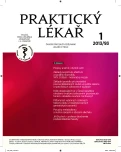-
Medical journals
- Career
Metabolic and nutritional disorders associated with alcohol abuse
Authors: I. Šmídová; J. Fiala
Authors‘ workplace: Přednostka: prof. MUDr. Zuzana Derflerová Brázdová, DrSc. ; Lékařská fakulta ; Ústav preventivního lékařství ; Masarykova univerzita, Brno
Published in: Prakt. Lék. 2013; 93(1): 26-30
Category: Of different specialties
Overview
The question of nutrition in persons that abuse alcohol is very important particularly when treating diseases, whether associated with alcohol consumption or not. Factors such as absorption from the digestive tract, energetic reserves, metabolism, immunity can all influence treatment and all these factors may be influenced by food ingestion and associated habits. The importance of nutrition for patients with malignant diseases, patients requiring intensive care, for patients with impaired food intake (e.g. oesophagus stenoses, diverticles, etc.) or maladsorption (bowel resection, inflammatory bowel disease) has been known for a long time and its influence is increasingly recognised. This article outlines how alcohol abuse affects a person in terms of nutrition and physiology of digestive tract.
Keywords:
alcohol abuse – nutrition, metabolism of alcohol – endocrine effects of alcohol
Sources
1. Kolektiv autorů. Merck Manual, kompendium klinické medicíny. Praha: X-Egem 1996.
2. Lüllmann H. Barevný atlas farmakologie. 2. vyd. Praha: Grada Publishing, 2001.
3. Klener P. a kol. Vnitřní lékařství. Praha: Galén 2006.
4. Fragakis AS, Thomson C. The health professional’s guide to popular dietary supplements. American Dietetic Association 2003; 526.
5. Schettler G. Repetitorium praktického lékaře, 1. čes. vyd. Praha: Galén 1995.
6. Nešpor K. Návykové chování a závislost. Praha: Portál 2000.
7. Brůha R. a kol. Jaterní encefalopatie – komplikace jaterní cirhózy. Praha: Medprint 2000.
8. Skála J. a kol. Závislost na alkoholu a jiných drogách. 1. vyd. Praha: Avicenum 1987.
9. Masopust J. Klinická biochemie. Praha: Karolinum 1998.
10. Chang R. Physical chemistry for the chemical and biological science. 3rd. ed. Sausalito, Ca: Univ. Science Books 2000.
11. Hlúbik P. Vitaminy – důležitý faktor ovlivňující zdraví, 2. část – metabolizmus hydrosolubilních vitaminů. Interní med., 2001; 3(12): 564–567.
12. Korbová L, Kohout J, Balaš V. Patofyziologie trávicího ústrojí. 1. vyd. Praha: Avicenum 1985.
13. Taimr P. Patogeneze fibrózy jater. Bulletin HPB chirurgie [online] 2002; 10(2–3) [cit. 19.3.2012]. Dostupný na: www.hpb.cz/index.php?pId=02-2-3-01
14. Heber DL. Nutritional Oncology. 2nd. ed. London: Elsevier 2006.
15. Hlúbik P. Vitaminy – důležitý faktor ovlivňující zdraví, 1. část – metabolizmus liposolubilních vitaminů. Interní med 2001; 3(11): 503–505.
16. Dolina J, Prokešová J, Kroupa R, Hep A. Prekancerózy jícnu a žaludku. Interní medicína 2007; 9(9): 392–393.
17. Hill M, Schreiber V, Stárka L. Hormony, zejména steroidní. Lékařské listy [online] 2012; 27 [cit. 23.2.2012]. Dostupný na: www.zdravi.e15.cz/clanek/priloha-lekarske-listy/hormony-zejmena-steroidni-137173
18. Nešpor K, Holeštová D, Zima T. Alkohol a poruchy minerálního a vodního hospodářství. Čes. a slov. psychiatrie 2005; 101(6): 331–332.
19. Mach I. Doplňky stravy na našem trhu. Praha: Svoboda Servis 2006.
20. Kalvach Z. a kol. Geriatrie a gerontologie. Praha: Grada Publishing 2004.
Labels
General practitioner for children and adolescents General practitioner for adults
Article was published inGeneral Practitioner

2013 Issue 1-
All articles in this issue
- Oral manifestations of anaemia
- Basics of social cognitive and affective neuroscience XXV. On happiness – the hedonic brain
- The basic rules for providing occupational health services by the law concerning specific health services
- How many adolescents are threatened by permanent deterioration of cognitive functions due to marihuana smoking?
- The presence of selected risk factors of falls in hospitalized geriatric patients
- Metabolic and nutritional disorders associated with alcohol abuse
- General Practitioner
- Journal archive
- Current issue
- Online only
- About the journal
Most read in this issue- Oral manifestations of anaemia
- Metabolic and nutritional disorders associated with alcohol abuse
- The basic rules for providing occupational health services by the law concerning specific health services
- Basics of social cognitive and affective neuroscience XXV. On happiness – the hedonic brain
Login#ADS_BOTTOM_SCRIPTS#Forgotten passwordEnter the email address that you registered with. We will send you instructions on how to set a new password.
- Career

